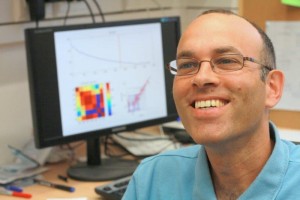Title: New devices for tracking microbial evolution and antibiotic resistance
Presenter: Professor Roy Kishony
University: Technion - Israel Institute of Technology
Time: 10:00-11:00, December 18, 2015
Venue: Room A102, Institute of Microbiology, Chinese Academy of Sciences
Abstract:

Can the future of antibiotic resistance be predicted?
How can Computational Biology change the foundations of infectious disease diagnostics?
Can antibiotic resistance be reversed?
Combining novel quantitative experimental techniques and clinical studies with mathematical modeling and advanced data analysis, professor Roy Kishony are studying microbial evolution with a specific focus on antibiotic resistance. He aim at understanding how bacterial pathogens evolve resistance to antibiotics within the human body during infection and how combinations of drugs can be used to slow down and perhaps even reverse this process.
Professor Roy Kishony has recently joined the Technion from the Department of Systems Biology at Harvard Medical School. You can also explore our site at Harvard: http://kishony.med.harvard.edu/
Current Publications:
2015. Counteraction of antibiotic production and degradation stabilizes microbial communities. Nature
2015. Delayed commitment to evolutionary fate in antibiotic resistance fitness landscapes. Nature communications
2015. Polyploidy can drive rapid adaptation in yeast. Nature
2014. Editorial overview: Antimicrobials: grappling with the complexities of antibiotics and resistance. Current Opinion Microbiology
2014. Alternating antibiotic treatments constrain evolutionary paths to multidrug resistance. PNAS
2014. Opposing effects of target overexpression reveal drug mechanisms. Nature Communications
2014. Genetic variation of a bacterial pathogen within individuals with cystic fibrosis provides a record of selective pressures. Nature Genetics
2013. Understanding, predicting and manipulating the genotypic evolution of antibiotic resistance. Nature Reviews Genetics
2013. Building a morbidostat: an automated continuous-culture device for studying bacterial drug resistance under dynamically sustained drug inhibition. Nature Protocols
